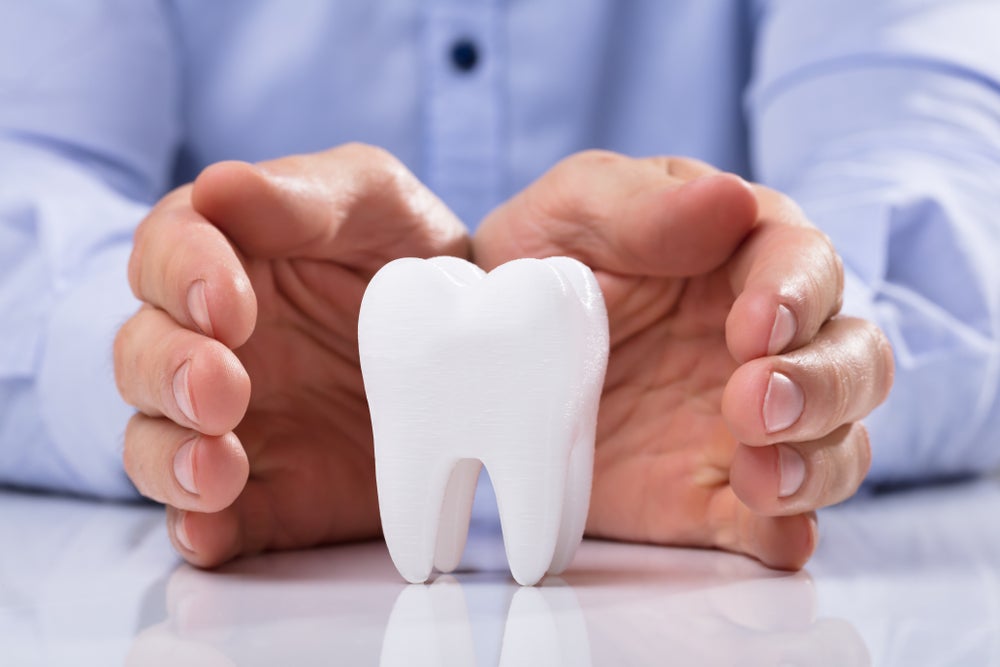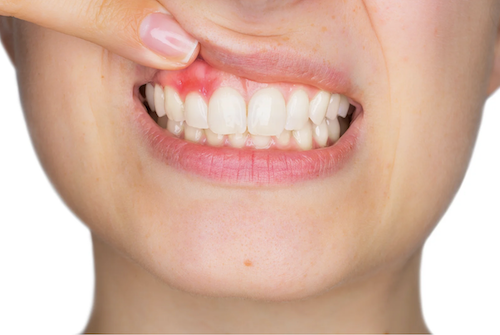Gum Disease and Nutrition

Do nutritional habits promote the development of gum disease?
Periodontal health is affected by oral hygiene, genetic and epigenetic factors, systemic health, and nutrition. While inadequate nutrition can contribute to poor oral health and lead to gum disease, tooth loss due to advanced periodontal disease will also impact negatively on nutrition with related eating difficulties.
Extensive research studies have concluded that a balanced diet with proper nutrition, along with regular dental care plays an important part in maintaining periodontal health. Nutritional supplements and dietary components have also been shown to improve healing after periodontal surgery.
Furthermore, nutritional factors are also implicated in many systemic diseases and conditions. These in turn are associated with periodontal diseases, as we explore in articles about obesity, hypertension, type II diabetes, and cardiovascular disease.


In a study undertaken in Bern (Switzerland), Baumgartner, et al. examined the oral health of two families (10 people) who lived in Stone Age conditions for a month while participating in a television programme. This meant they ate a Stone Age diet and completely abandoned domestic dental care with toothbrush and toothpaste. The results are fascinating. Although pronounced plaque coverage was observed in almost all participants, no participant developed periodontitis. Moreover, there was a marked decrease in BoP levels compared to the baseline. Interestingly, it became clear that colonization with Tannerella forsythia (strongly implicated in the onset of periodontitis) was significantly reduced after four weeks - without antibiotics or chemotherapeutic agents.
Archaeological investigations on the skulls and jawbones from the Neolithic period support the results of the Baumgartner study. Adler, et al. succeeded in analysing the bacterial DNA from tartar of approx. 7000-year-old teeth from hunters and gatherers. The results of the analysis showed that humans at that time had three times as many different types of bacteria in their mouth, and yet were in a healthy periodontal state.
The analysis of further tartar samples revealed a dramatic decline in bacterial diversity with the onset of agriculture and the associated significant reduction in nutritional diversity, In these teeth, it was already possible to identify periodontitis-related alveolar bone loss. The authors concluded that modern oral microbiotic ecosystems are markedly less diverse than historic populations, which might be contributing to chronic oral (and other) disease in post-industrial lifestyles.
In summary, it is clear that diet is associated to oral bacterial diversity, and that less diverse oral microbiota may encourage the overgrowth of pathogenic bacteria. Similarly, accumulating data indicates that an imbalance of the oral microbial flora seems to contribute to both oral diseases and systemic diseases.
Can we therefore speculate that plaque alone may not cause gingivitis, but instead that plaque composition also plays a significant role? There are signs to back up this hypothesis.
Scientific evidence
- Periodontal disease is an oral health condition caused by specific bacteria that form plaque on the teeth and gums causing tooth decay and diseased gum tissue which leads to tooth loss if untreated
- Research highlights that around 40%–90% of the global population is affected by periodontal disease, making it one of the most prevalent epidemics in the world
- Research has proven that dietary sugar is the main contributing factor and cause of tooth decay
- The higher the frequency of sugar consumption, particularly when kept in the mouth for a long time, the higher the risk of tooth decay
- An increase in fluoride intake, coupled with a good oral hygiene regime can modulate the impact of sugar and caries risk but a reduction in overall sugar intake has the most health benefits
- Tooth loss affects chewing ability which impacts nutritional choices, commonly the avoidance of healthy food choices which then affects general health
How Professionals Can Help
Lettuce juice extract for gingivitis prevention
Given that diet influences metabolic function, does it also affect the composition of oral and gut microbiota? The fact that high-fibre diets are beneficial to health has been a well-known fact for some time. We now know that diet also has a considerable effect on the composition of the digestive (oral and gut) microbiota and that poor modern diets are associated with an intestinal microbiome that increases the risk of several chronic diseases, including inflammatory bowel disease, obesity, type 2 diabetes, cardiovascular disease, and cancer.
This is further backed up by new data from a randomised-controlled study carried out at the University of Würzburg in Germany. In this study, 44 periodontal recall patients with mild to moderate gingivitis were recruited. All patients received periodontal maintenance therapy without further oral hygiene instructions and were randomised to either a nitrate rich lettuce juice drink, or a placebo drink - three times daily for a period of 14 days. All patients were on a strict nitrate-poor diet. In the test group with the nitrate-rich beverage, the nitrate intake was increased by approx. 200 mg nitrate/day. The results after just 14 days were fascinating. There was a significant difference in the mean GI values (GI-gingival inflammation) in the nitrate group compared to the control group. The authors concluded that dietary nitrate consumption may be a useful adjunct in the control of chronic gingivitis.
A diet low in simple carbohydrates promotes oral health
At the University of Freiburg in Germany [1], ten subjects changed their diet for four weeks. The new diet was low in simple carbohydrates (i.e. foods containing easily digested natural sugars that provide quick energy, unlike healthy complex carbohydrates such as whole grains, beans, legumes, and oats), rich in omega-3 fatty acids, vitamin D and vitamin C. It was also designed to include antioxidants and fibre. The control group did not change their dietary behaviour. Again, although plaque levels remained constant in both groups, gingival inflammation (GI), bleeding on probing (BoP), and periodontal inflamed surface area (PISA) decreased by roughly 50% in the test diet group. This reduction was significantly different compared to the control (unchanged) diet group. This study again indicates that a healthy diet has clear influence on oral health (as measured by gingival and periodontal inflammation).
- Provide advice on the reduction of daily sugar intake (including those with added sugars such as sodas and fruit drinks)
- The role of good nutrition for gum health should be emphasised to high risk patients at all appointments
- Advice should be given to expecting mothers and new parents on preventing ‘bottle caries’ or baby bottle tooth decay
- Check-ups for children should include careful examination to identify high risk patients, appropriate use of fluorides and advice on tooth brushing and limiting daily sugar intake (particularly sugary drinks)
- Ensure generous consumption of fruits and vegetables and adequate folic acid intake
- Replace saturated and trans fats with unsaturated fats, including sources of omega-3 fatty acids
- Consume cereal products in their whole-grain, high-fiber form.
- Limit consumption of all of the following: sugar and sugar-based beverages, sodium intake, and excessive caloric intake from any source.
- Periodontal treatment can reverse the disease and its impact on systemic health while ensuring tooth retention and improvements in bad breath
- Scaling, root planing, and the use of xylitol- and maltitol-containing gums are proven to have potential to improve the periodontal health
- Tooth extraction patients need additional support with new prosthesis and follow-ups to ensure chewing and eating is not compromised. Implant retained dentures should also be considered as a further treatment option as a benefit for nutrition
- Dentists should refer patients to dietitians and other specialists if there is suspected systemic disease that is undiagnosed and linked with compromised periodontal health
- Patients should be informed that a diet rich in foods such as fruits, vegetables, whole grains, nuts, fish and unsaturated fats together with regular physical activity contributes greatly to overall health, including dental & gum health.
- Regular nutrition advice should be offered as part of check-up consultations
- Extraction appointments should include advice about maintaining a healthy diet, for both dental and systemic health
- Dental caries eventually leads to tooth loss, which in turn impairs chewing ability causing avoidance of hard and fibrous foods including fruits, vegetables and whole grains. Integrating dietary counselling into the dental setting warrants further investigation
“Let food be thy medicine and medicine be thy food.”
Hippocrates
References
- The Role of Nutrition in Periodontal Health: An Update, Shariq Najeeb et al, Nutrients. 2016 Sep; 8(9): 530.
- Nutrition and health: guidelines for dental practitioners, C Palacios, KJ Joshipura, and WC Willett, Oral Dis. 2009 Sep; 15(6): 369–381.
- The interrelationship between diet and oral health. Moynihan P, Proc Nutr Soc. 2005 Nov;64(4):571-80
- British Society of Periodontology
- Woelber JP, Gärtner M, Breuninger L, et al. The influence of an anti-inflammatory diet on gingivitis. A randomized controlled trial. J Clin Periodontol. 2019; 46: 481–490.






